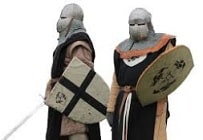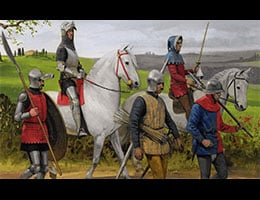 The Latin word scutarius came into our language as squire . It is a term with several meanings recognized by the Royal Spanish Academy ( RAE ) in its dictionary .
The Latin word scutarius came into our language as squire . It is a term with several meanings recognized by the Royal Spanish Academy ( RAE ) in its dictionary .
A squire is an individual who, by kinship or blood, was part of some class of nobility . It is worth remembering that the social stratum made up of those who had a title from the kingdom, either by grant from a monarch or by inheritance, is called nobility.
A knight's assistant whose function was to carry his shield was also called a squire. In times of peace, these servants were in charge of serving the lord in various areas.
The life of medieval squires was very particular: on the one hand, they were servants, since they had to work for their master for many years or even their entire lives; but their position was quite respectable for the time and their obligations were not as sacrificial as those of the vassals who worked the fields.
Generally, the squire did not fight alongside his knight, but rather carried his shield and assisted him in everything he might need, such as replenishing weapons and horses, healing his injuries, transporting the wounded to the ground. the battlefield to a safe area to care for them and, if they did not survive, to bury them in a dignified manner. Although the warriors had no interest in facing the squires of the other side, since they focused on people of the same rank or higher, it was common for the squires to try to defeat a knight, due to the prestige that this would give them. I would assume.
The training of the medieval squire was varied: on the one hand, he trained in the art of war, but he also learned to read and, in many cases, to write, in addition to studying singing, music and dancing. When he reached 21 years of age, he had the possibility of being knighted. This honor was received from a knight or lord, through a simple ceremony, in which he touched his shoulder with a sword (a very popular image thanks to its use in fiction).
Of course it was not easy to become a knight; The squires who had this luck usually owned land or had enough income to face the responsibilities that this rank entailed. They could also obtain this recognition on the battlefield, if they demonstrated unusual performance and attracted the attention of a great lord.
 In short, the life of the medieval squire was not exactly that of a slave, but many used it as a transitional stage towards their great plans for the future, during which they had the opportunity to receive a good education and do things. friendships with influential people.
In short, the life of the medieval squire was not exactly that of a slave, but many used it as a transitional stage towards their great plans for the future, during which they had the opportunity to receive a good education and do things. friendships with influential people.
Another meaning of squire that the RAE mentions refers to someone who is dedicated to making shields . These defensive weapons, used to protect the body from different types of attacks, were very important when most combats were carried out hand-to-hand. Currently, shields are only useful for security forces in certain areas.
Escudero , finally, is a fairly common surname in Spain and in some Latin American countries . Osvaldo “Pichi” Escudero , for example, was an outstanding Argentine soccer player who became champion of the 1979 U-20 World Cup with the national team and who played for Boca Juniors , Unión de Santa Fe , Rosario Central , Barcelona of Ecuador and other equipment.
Vicente Escudero (1888-1980), on the other hand, was a prominent Spanish choreographer and dancer, who also dedicated himself to literature , painting and acting. Escudero contributed to popularizing flamenco.
